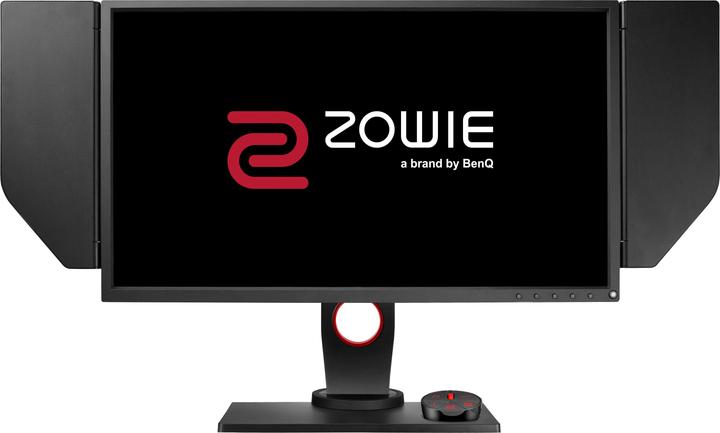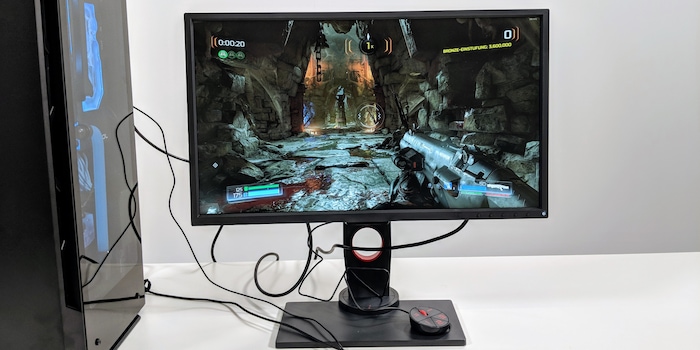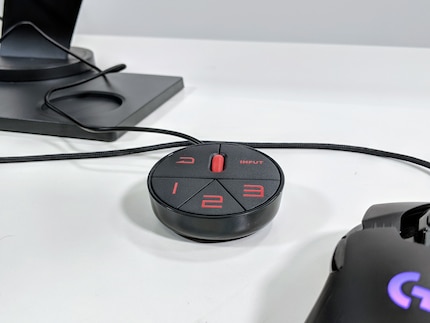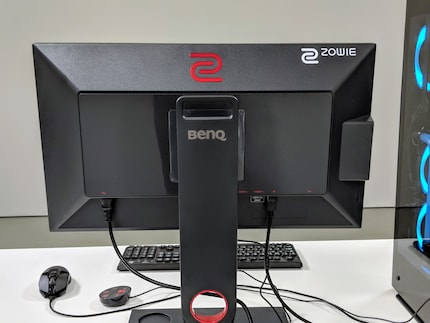

240 Hz monitor test: overrated or not?
Is the story of megapixel cameras repeating itself with high-frequency screens? Are they really worth playing with? We tested Benq's Zowie XL2546.
How many hertz do we really need? A standard screen has 60. 100 Hz, 120 Hz or even 144 Hz models are no longer the exception among gamers. High-frequency screens have made their mark, particularly in the field of e-sports. Benq has just released a new 240 Hz screen. As the proud owner of a 100 Hz screen, I'm already very satisfied. Can you really tell the difference with such high values? I can't help thinking of cameras that are constantly gaining in megapixels, but not really in image quality.
Benq is clearly targeting the e-sports scene with the Zowie XL2546. Although we don't (yet) make our living from pro gaming, many of us are keen gamers and attach great importance to screen quality. So I asked four of my colleagues to test the screen with me. We didn't do a blind test, which wouldn't have made much sense, but we tested the screen one after the other. The non-testers changed the refresh rates ranging from 60 to 240 Hz and the tester had to guess which frequency the screen was set to.

More hertz all right, but why?
Before moving on to the test, I looked at the refresh rate of the image. A standard screen, the one we usually have in the office has 60 Hz. This means that the screen refreshes the image 60 times per second - the change is invisible to the naked eye. The latest LCD and OLED screens, on the other hand, offer much higher values. The refresh rate differs from the fps value (the number of frames per second) of a PC screen.
A high refresh rate doesn't do much for gamers. If you have a 240Hz screen, but your PC only has 100 fps, the image won't be refreshed 240 times a second, but about a hundred times. And vice versa, if the fps value is higher than the refresh rate (for example: 120 fps and 60 Hz). Update: user Spl4tt has brought something interesting to the conversation, or in his words: "New shit has come to light." A high fps value relative to refresh rate can apparently be an advantage. I'll leave it to the pros to judge for themselves.
Find the test here.
If the Hz and fps values are close, a higher value will give a smoother image.
The test
We tested the screen with the games "Metro Last Light", "Counter Strike GO" and "Doom". We quickly tried all the games with a GTX 1080 Ti and an i7 8700K. "Doom' is unfortunately limited to 200 fps. Taking turns, we tried to differentiate between the different refresh values, set by a colleague while we weren't looking.
Here are the screens we have at home:
Jan Heidenreich, 144 Hz [[productlist:4644429]]
Raphael Knecht, 165 Hz [[productlist:5873307]]
Roy Sonderegger, 60 Hz [[productlist:2585375]]
Sebastian Karlen, 144 Hz [[productlist:4677310]]
Philipp Rüegg, 100 Hz [[productlist:5772108]]
Everyone recognised the 60 Hz setting. It's impossible not to see the difference when you compare 60 Hz to a higher frequency. "Ouch, that's enough to give you eye cancer," says my colleague Jan Heidenreich spontaneously, when I link 60 Hz directly after 144 Hz. For values above 100 Hz, it's a different story. We all found it much harder to tell them apart. Our trick was to move the image back and forth quickly by looking closely at a corner of the wall. The lower the value, the more the image distorts. But you have to look very closely. Our conclusion: from 100 Hz, you're well off. With 144 Hz, you're sure not to go wrong, and even higher values are of real interest only to professional e-sportsmen.
Here are the results of our test. When testers weren't sure, I mostly asked if the refresh rate was higher or lower than the previous one instead of a specific value.
These are the results of our test.
| 60 Hz | 100 Hz | 144 Hz | 240 Hz | |
|---|---|---|---|---|
| Sebastian | 60 Hz | 240 Hz? | < 240 Hz | 240 Hz or 144 Hz? |
| Jan | 60 Hz | 100 Hz | 144 Hz? | 240 Hz or 144 Hz? |
| Roy | 60 Hz | 100 Hz? | 100 Hz? | than 100 Hz, i.e. 144 Hz + |
| Raphael | 60 Hz | > as 60 Hz | 60 Hz? | < 144 Hz |
| Philipp | 60 Hz | 100 Hz? | > 100 Hz | 240 Hz? |
What else can the monitor do?
In addition to the 240Hz 1080p TN panel, the Benq offers other handy features. It can be positioned vertically and the stand can be rotated 45° in either direction. The two removable eyecups protect against sunlight and prevent your neighbour from peering in. There's even a wired remote control to control the screen menu and quickly navigate between three display modes. The monitor features the following ports:
- 1x Displayport (1.2)
- 2x HDMI (2.0)
- 1x DVI
- 1x jack port 1x microphone port
- 2x USB 3.0
Viewing angles are quite wide and the screen has a relatively neutral colour spectrum. It's worth looking at the colour settings a little when setting up, as they are a little pale.

However, the screen isn't equipped with either G-Sync or Freesync - these technologies take care of preventing tearing, which could end up getting on your nerves. Benq has therefore equipped its screen with DyAc. Dynamic Accuracy is supposed to give you a clear and fluid display, but we didn't notice any difference in the image with or without DyAc. But with the monster PC set up by Christian Seeholzer, all the games ran without a hitch.
Conclusion: for pros only

Our test clearly demonstrates that high-frequency screens are not pure gadgetry. The picture really is smoother than on a 60Hz screen - especially with a 240Hz display. But there's no need to go that high; most of us will be satisfied with less extreme values. At 100 Hz, it's already not bad, and at 144 Hz you'll need a damn good view to see the difference. You should also bear in mind that your PC needs to be powerful enough for this. If the fps and hertz values are too different, you won't get much out of your super screen. For gamers who shoot around 144 fps, I'd recommend a high-resolution screen. For those who compete on the other hand, Benq's Zowie XL2546 is a wise choice.
As a child, I wasn't allowed to have any consoles. It was only with the arrival of the family's 486 PC that the magical world of gaming opened up to me. Today, I'm overcompensating accordingly. Only a lack of time and money prevents me from trying out every game there is and decorating my shelf with rare retro consoles.
